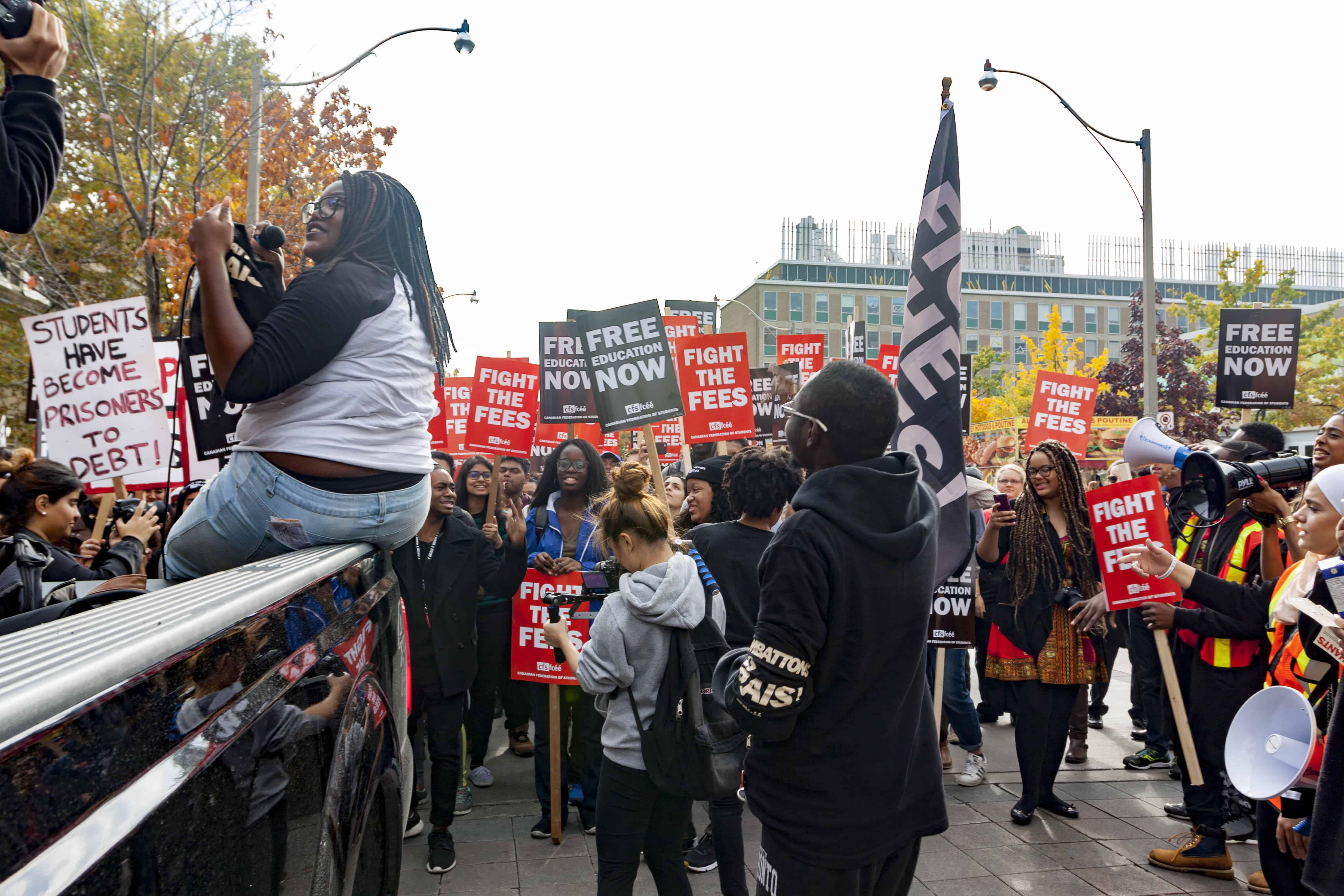Three weeks ago, the UTSU hosted a roundtable discussion with the provincial Minister of Advanced Education and Skills Development Deb Matthews. After the meeting, the UTSU declared it a victory, receiving a commitment from the minister to facilitate future face-to-face conferences and to consider adding a seat to the Post-Secondary Advisory Council for a professional faculties representative. Matthews returned to Queen’s Park touting her “great relationship” with the students’ union, commenting during the roundtable that the ministry and the UTSU “couldn’t be any closer.”
In January, the province renewed the three per cent cap on tuition fee increase for two more years, following lobbying by multiple student groups, including the UTSU.
Since the Liberals formed their government in Ontario in 2003, tuition fees in the province have increased by approximately 65 per cent. While the average cost of tuition in the province was $4,923 in 2003, today the average cost is $8,114.
Under the negotiated three per cent cap, the average domestic student in the province will pay another $250 in fees next year and international students’ fees will remain exempt from any provincial protections.
With these facts in mind, it is puzzling how the province’s largest students’ union could celebrate a positive relationship with the provincial government, or how anyone could justify further increases in fees as a victory.
The UTSU’s advocacy methods are not working, and new tactics and partnerships need to be adopted in order to achieve real change in all areas that affect students’ interests.
The consistent rise in tuition fees over the past 10 years is an indication that the UTSU’s conservative approach to fee reduction is failing. While the UTSU has often been quick to criticize methods like protesting — favouring roundtable discussions and building coalitions with the provincial government instead — the evidence in favour of collective action could not be clearer.
Student movements throughout history demonstrate that collective action is the most efficient channel to instigate change. In 1968, student protests in Paris against practices of capitalism and consumerism in French society brought the country to the brink of civil war and forced the de Gaulle government to call an election.
More recently, in 2012 the Québec government proposed a $1,625 increase in tuition fees over six years; about 310,000 students protested for more than 100 days, eventually forcing a change in government. When the Parti Québécois formed government, the decision to so drastically raise fees was recanted.
Even the UTSU has conducted successful collective action campaigns in the past. Although admittedly milder than campaigns in Québec and France, when the university proposed implementing a flat fee across all faculties in 2013, over 6,000 postcard petitions were collected by the UTSU, forcing the government to enact a policy restricting the practice.
The cost of tuition in Québec only provides further evidence of the success of more radical campaigns. The consistent commitment of Québec students to protest fee increases has kept their tuition fees among the lowest in the country.
Hovering around $2,851, Québec students pay only 35 per cent of what the average student in Ontario does for tuition.
Yet it is not just the issue of rising tuition fees that the UTSU has failed to take meaningful action on. Over the past four years, the UTSU has failed to mobilize its membership toward the variety of social justice issues it claims to advocate for.
Lack of meaningful action on fossil fuel divestment, precarious work, and equality rights for racialized students has forced passionate undergraduates to form smaller collectives to protest these issues. Student groups like UofT Divest, the Black Liberation Collective, and The Free Tuition Coalition have filled the gap left by the UTSU on these issues — yet they have been hindered by their inability to organize in large numbers.
A lack of solidarity with other campaigns on the part of the UTSU could arguably impact the support students will receive from other movements in the future. For example, when Scarborough campus cafeteria workers went on strike last month, the UTSU failed to mobilize its membership in solidarity with them. While representatives of York University’s students’ union were present on the St. George campus for a protest against university administration last month, few U of T students stood with the workers.
The goal of any union is to not only provide services for its members — as the UTSU does through a health and dental plan, social events, and other services — but also to meaningfully advocate on behalf of its membership.
At present, the UTSU appears to be failing at accomplishing the latter. And with potential efforts to separate from the CFS coming this fall, pending the success of the You Decide campaign, this should be concerning to students. The CFS has engaged in a number of meaningful activist initiatives in the past, effectively providing an alternative means of organization outside the UTSU’s methods.
Consequently, the UTSU needs to take concrete steps to prepare for action outside of the national coalition by creating partnerships with other social justice campaigns, organizing its members, lobbying for more drastic ideals, and using more radical tactics to affect change.
The UTSU has the membership volume, and U of T students have the prestige and visibility required to lead the struggle against issues ranging from tuition fees and precarious work to climate change. No matter who is elected to lead the union through the next academic year, it is time for the UTSU to break out of its cycle of conservative methods and embrace collective action to prompt real changes in policy and in practice.
James Chapman is a second-year student at Innis College studying Political Science and Urban Studies.


